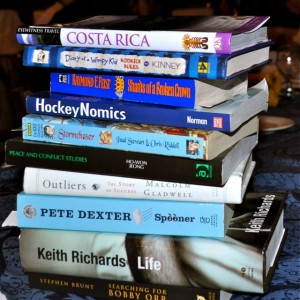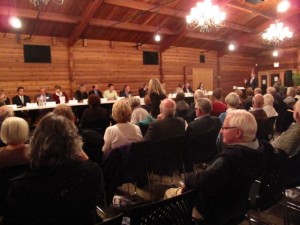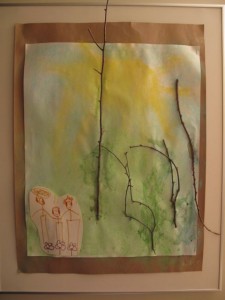Posts Tagged ‘education’
What Does It Mean?
Stepping into a profession, we can expect to be bombarded by acronyms and terms specific to that field. The BC public education system, for example, is rife with them: MoE, BCSTA, BCPSEA, BCSSA, BCASBO, BCTF, CUPE, BCCPAC, HR, F&F, AFG, AbEd, IB, PYP, MYP, IEP, FSAs, standardized testing, needs assessment, self-regulation, special needs, 21st century learning, etc.
Amongst the list of terms is one used to describe the model in which Boards of Education and the provincial government function: co-governance.
But what does co-governance mean?
I decided to look it up and started with the word governance. Here’s what I found:
governance:
- government; exercise of authority; control.
- a method or system of government or management.
And “co-”? It’s apparently a variation of “com-” which is defined as follows:
a prefix meaning “with,” together,” “in association,” and (with intensive force) “completely,” occurring in loan words from Latin (commit): used in the formation of compound words…
Putting the two together, I can say co-governance is a shared exercise of authority, control exerted in association with one another, or a partnership system of government or management.
Defining the term is easy, but applying it to BC’s public education system, as currently structured and operating, may be a misnomer.
Why?
Because the inherent nature of the relationship is one of imbalance. Public education is financed by public revenues which are allocated by the province.
And if one party in a relationship is the ultimate arbiter of funds, then it may be a challenge to ensure that other critical issues are addressed on the basis of a co-governance model. In the past few weeks alone, we’ve seen the release of a 10-year framework for bargaining as well as the debut of a new website, mostly with little or no direct consultation with Trustees.
I’ll admit it’s not easy when one has a firm grasp of the purse strings to share control, but the current structure is paternalistic and does not lend itself easily to a co-governance model.
And while my call for a Royal Commission on Education is likely to continue falling on deaf ears, here are two things I’d like to see.
First, I would like all eligible voters in BC to vote in the May 14 provincial election no matter what their political persuasion.
Second, I would like the new government, whether Liberal, NDP, Green, Conservative, or other to convene a meeting with Board of Education Trustees. Maybe two from each district. That’s a group of 120 people.
And talk.
Have a real discussion.
A substantive discussion.
One where Trustees do most of the speaking and elected officials and Ministry representatives do the listening.
And then do the same with each significant group in the education sector.
Compile the results of these discussions, distribute the report, and then put everyone in a room together to see if we can work together to ensure that our children will continue to benefit from a vibrant and thriving public education system.
One that is not characterized, if I may borrow from the philosopher Hannah Arendt, by questions of “what are we fighting against”, but “what are we fighting for?”.
And let’s see, if through dialogue, we can put the “co-” back into “co-governance”.
What’s In A Word?
In 2010, I was accepted into the Graduate Liberal Studies (GLS) program at Simon Fraser University (SFU).
Going back to school, part-time, was one of the best decisions I’ve ever made. In addition to reentering the world of study and immersing myself again in the humanities, my status as a Masters student allowed me to apply for Teaching Assistant (TA) positions at SFU. I’ve been fortunate to serve as a TA in the Department of Humanities for four terms.
I love being a TA. I love attending lectures and brushing up on familiar subjects and topics or delving into new ones. I love the dialogue with students in tutorial — especially on those days when they decide to leap into the discussion — and I love the challenge of trying to figure out how to engage them in texts so that they see how a work that’s centuries old does have relevance to their world today.
And I love playing a role, however small, in helping them develop their writing skills. However, I’m frustrated by the general level of writing I’ve encountered in these courses especially since the participants represent the gamut of undergrad experience, from level one to level five or higher.
It’s more than a question of writing. Although we live in an age of literacy, it seems to me to be a question of reading.
Why?
 Because in a world where information is literally at our fingertips, students do not take the time to search out a reference in a literary work or to look up a word.
Because in a world where information is literally at our fingertips, students do not take the time to search out a reference in a literary work or to look up a word.
A simple check in a dictionary app or online could make all the difference in the interpretation of a passage from a primary document or a novel or a philosophical treatise.
A simple Google search can tell you more than you’d ever need to know about a name or time which adds layers of meaning to assessing an author’s intent or understanding a character.
And I find that I can pick out the words which students will most likely not have understood or not have taken the time to investigate, with eerie accuracy, even if they are what I would consider simple words for someone studying at the post-secondary level.
The latest such word was “pious”.
The professor I’m working with this term used the word during his lecture. He was talking about characters or figures who, albeit pious, face serious consequences in their lives. That is, the tragedies with which they contend are not a reflection of their personal morality, but are often a reflection of their time and the socio-cultural values of their societies. That’s a much more sophisticated analysis than saying they were “bad” or “unlucky”.
What’s in a word?
The world is in a word.
A world of meaning is embedded in a word, a world of interpretation, a world of understanding.
Words by the Bee Gees (1968)
You think that I don’t even mean
A single word I say
It’s only words and words are all I have
To take your heart away
Crazy Little Thing Called Twitter And The FSAs
At first I lurked.
I’d log on to Twitter.com and scroll through the streams, fascinated.
I started to tweet in support of my campaign during the 2011 civic election and now it’s part of my daily routine.
With Twitter, I keep an eye on my community. I get news from around the world. I read analyses of issues and events from different perspectives. I interact with well-known figures and people in faraway places, opportunities I may never have had otherwise.
Twitter is also ugly at times, “nasty, brutish, and short” in the words of Thomas Hobbes. And while it is liberating to talk to so many so easily, Twitter is also constraining.
Why?
My Twitter account is a mirror of who I am as a whole person, but that whole person includes being a public figure. I have to be aware that although I am speaking personally, some may mistakenly take my views as those of the West Vancouver Board of Education. I have to be aware that while I distinguish between the different hats I wear in life and the various roles I play, others may not.

Which brings me to the Foundation Skills Assessment (FSAs), a test administered to Grade 4 and Grade 7 students throughout British Columbia.
Twitter streams were on fire about the FSAs recently, but I kept mum. I felt that whatever I said in 140 characters could be mischaracterized.
Here’s some of what I wanted to say.
As a parent, I had no objection to my child writing the FSA. As a Trustee, I see value in the data collected because it can be used to align resources with demonstrated need.
Here’s the problem: what we want the FSA to do and what is done with the FSA results have diverged.
FSA data, in addition to use by the provincial government and by school districts, is used by a third-party organization to rank schools.
The Fraser Institute rankings are myopic: they claim to present an overall picture of a school, but the rankings seem to be unduly weighted on one factor, FSA scores.
Rather than the FSA, why not invest in developing literacy screeners for key grades, the results of which would be privately held and exclusively used by the school, the district, and the student’s family? I’m thinking of something like the early literacy screening used for kindergarten students in West Vancouver.
And while I acknowledge that provincial measures are needed for accountability purposes, perhaps a better method of tracking student performance could be determined through a consultative process with key partner groups.
Perhaps by separating the two requirements — diagnostic and reporting — and by creating mechanisms for each, we would be spared the yearly rankling spectacle of school rankings.
At our January public board meeting, Sandra-Lynn Shortall, District Principal – Early Learning, paraphrased a conversation she’d had with Dr. Stuart Shanker. “Early intervention,” she said, “is not the answer to helping students address their needs, rather it’s continuous intervention and connectedness.”
Just as Twitter is not always the best mode of communication, the FSA may not be the best mechanism to match vulnerable or struggling students with the continuing supports they need to succeed in our public education system.
I think we can do better.
A Conversation Starter Or The End of A Conversation?
Ratified. That’s the word which characterizes this weekend for me. It denotes success and a goal accomplished. It indicates progress and sets a marker for the way forward.
The Agreement in Committee, a framework for bargaining which was fashioned in a collaborative effort between BCPSEA* and the BCTF**, was ratified this weekend at two separate meetings: the BCPSEA Annual General Meeting and the BCTF Representative Assembly.
This is a bold step for these two organizations. It sets the stage for positive dialogue before the start of labour negotiations. That doesn’t necessarily mean the discussions will be easier or decisions arrived at without difficulty; it does mean that the parties have opened a door to a respectful process, respectful interaction, and — I hope — results.
Yet this step forward may have been jeopardized given the startling turn of events on Thursday, January 24, 2013.
Why?
On Thursday, the provincial government released a document entitled “A Framework For Long Term Stability In Education” ) which came as a surprise to many of us who have a role to play in the public education system in British Columbia.
Although stakeholder submissions had been made by key partner groups on the issue of bargaining before the December holidays, this framework was much broader and incorporated many more issues than I believe were contemplated in those submissions.
While the goal of “stability” in education is admirable, and the narrative that has been designed to sell this new initiative may sound awfully good, scratch beneath the surface and many troubling issues emerge.
For example, why 10 years? Where is the business case for introducing a level of inflexibility which may take away from the employers’ ability to respond to changing circumstances and uncertain economic conditions? Given rapid changes in technology and the reassessment of education, which seems to be in progress in many parts of the world, proposing such a lengthy time span seems like building your foundation on shifting sands.
Premier Clark and Don McRae, the Minister of Education, have both spoken about the plan and the media, including the full array of social media, have played and replayed, digested and parsed their comments.
I also had the opportunity of hearing Minister McRae speak in-person at the BCPSEA AGM today.
He said, again, that this framework was just the beginning, but I see it as stalling momentum rather than encouraging it.
Rather than asking what the best way to fund the public education system may be, we are now debating the merits of establishing yet another separate fund to deal with specific aspects of program delivery and service provision.
Rather than asking what the best way to set educational policy may be, we are now debating who should sit at the table of the proposed educational council.
Rather than asking how to ensure the best working relationship between the parties who negotiate, we are now trying to guess why the government seems intent on stripping BCPSEA of its core mandate which is to bargain on behalf of the 60 school boards in the province.
This government-proposed framework, says Minister McRae, is a conversation starter.
I see it, unlike the now-ratified Agreement in Committee, as a conversation ender.
*British Columbia Public Schools Employers’ Association (https://www.bcpsea.bc.ca)
**British Columbia Teachers Federation (https://www.bctf.ca)
Is Mean Really What It Takes?
I’m a Gleek, a fan of the television show Glee. It first aired in 2009 and although I fell off as a spectator last year, I’ve picked up the habit again for Season 4.
Britney 2.0, the most recent episode, aired last Thursday. Incorporating music by Britney Spears, for the second time in the show’s history, and tracing the development of a key character, the episode also alluded to the real life trauma, the very real events in the public roller coaster ride of Ms. Spears’s celebrity existence.
But that’s not what I want to talk about.
Another story line this year follows Rachel who has moved to New York to attend a prestigious performing arts academy in the Big Apple.
Rachel’s dance teacher is Cassandra July, played brilliantly by actor Kate Hudson. With a predictable coulda-been-a-star background, Cassandra’s teaching style is abrasive and vindictive. To move the plot along, as you might expect, her scapegoat is Rachel, the young woman from the small town with the big dreams of making it on Broadway.
At one point in the Britney 2.0 episode, Cassandra says, “I pick on my students because I want them to be ready for that.” That being the difficult and rejection-filled life of being a musical theatre professional.
The show reflects the mindset that what doesn’t break you makes you stronger. I find this sentiment abhorrent.
Why?
Because it justifies meanness. It rationalizes the abuse of power. It embodies a stereotype of the cruel authority figure whose behaviour is sanctioned as being for one’s own good.
There may be individuals who thrive under such a system and there are those who are motivated by an I’ll-show-’em bravado. Most of us, I conjecture, wilt if we’re starved of encouragement and trampled under the weight of another person’s ego.
Many of us likely carry such hurts already.
Being mean is not the same as being constructive. Being mean is often destructive. And there can be nothing worse than when that meanness comes from those whom we admire whether our parents, our siblings, our family members, our friends, our colleagues, our coaches, our mentors, or our teachers.
Education is not coercion nor compulsion. Learning does not come about when you harp on weaknesses or failures or transgressions.
While I obviously cannot say how the season of Glee will unfold, I’ve watched enough American television and enough American films to predict that at some point Rachel will thank Cassandra July for challenging her, for being so mean.
Rachel will acknowledge that Cassandra made her dig deep, overcome crushing criticism — if not outright belittlement– and helped her take those crucial steps along that yellow brick road to making her dreams come true.
This portrayal perpetuates a stereotype of what it takes to be successful, but even more damaging in my mind is the stereotype it perpetuates of the tough-love teacher.
And that’s a stereotype it’s time for us to break even if it’s only on television.


